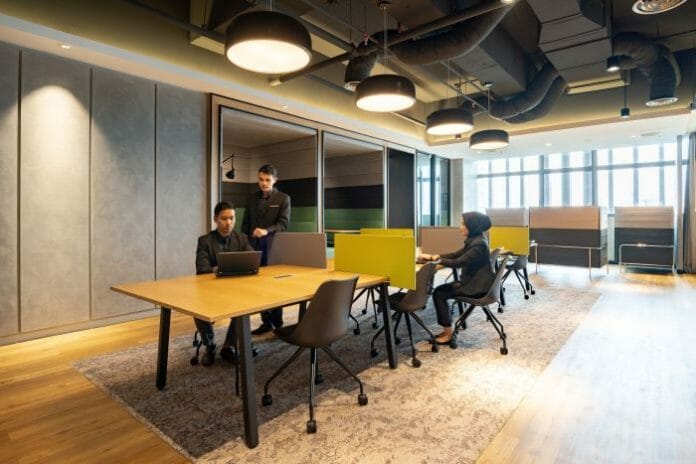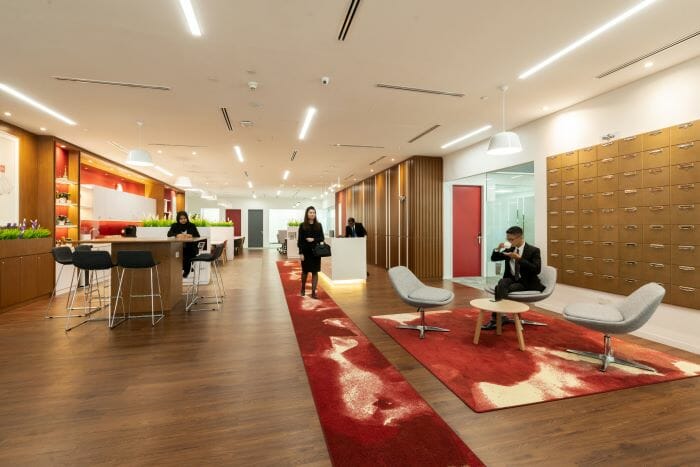Even prior to the outbreak of the COVID-19 pandemic, there had been shifting trends when it came to working at the office, such as a move away from open offices and dedicated office development, the popularisation of co-working spaces, as well as the onset of digitalisation and a flexible working environment.
The pandemic – and the movement (as well as other health-related) restrictions imposed by governments worldwide as a result – has impacted these trends significantly, with employers and employees both being forced to explore different methods of working given these constraints. Businesses of all sizes started switching to the hybrid model in droves – empowering their employees to work wherever is most convenient. Against this backdrop, the market for flexible working spaces (flexspace) continued to grow in Asia Pacific by nearly 10% between mid-2020 and mid-2021, according to global real estate services firm Cushman and Wakefield Research.
The company also pointed out that while working from home does have benefits such as reduced commute times and greater focus for certain tasks, it can make it more difficult to maintain an optimal work/life balance, with some finding it hard to separate these two elements. Meanwhile, local flexspaces in the heart of communities that are accessible without a long commute have an advantage, in that they can provide employees with a more professional environment, and the ability to collaborate with others, away from the occasional home distractions.
With most of the world moving on to the endemic phase of COVID-19, many businesses have resumed work in the office – with the majority only requiring their regular employees to be present in-person on a part-time basis, and no longer the ‘9-5, Mon-Fri’ schedule that had been the norm for so long.
Armed with the experience gained over the past 2 years, employers and employees alike are now rethinking how and where work ought to be done. Given employee expectations in this brave new world of work, businesses are now figuring out how to best go about implementing new hybrid workplace strategies to match these expectations. According to multiple parties, including Gartner and Knight Frank, the ideal solution may very well be a hybrid working model that involves a combination of the traditional central office, working from home, and flexspace.
Research from IWG plc, the global leader in hybrid working, supports this finding, with 88% of office workers polled citing hybrid working as the leading employee benefit that they would expect from a new role, and nearly half stating that they would only consider roles that allowed them to work in a hybrid way, dividing their time between a central office, home and a local flexspace. Indeed, the survey noted that hybrid working is beginning to gain parity with salary, pension, and paid leave/holidays as one of the key factors to consider when looking for a new job.
At the same time, in-person collaboration is still important and the hybrid model offers the best of both worlds in this respect – whether it’s networking with like-minded individuals or colleagues at a local flexspace, or interacting with team members at the company HQ, humans remain social creatures.
Mark Dixon, Founder and CEO of IWG plc, notes that, “It’s clear that working solely at home or solely at a main office is not what people want or need. They love the sense of companionship that comes with face-to-face interaction, but they don’t necessarily want that every day of the working week. Their personal lives are becoming more important to them.”
Employers stand to gain from switching to the hybrid working model as well, not least from a financial perspective as the need for a large central office located in the CBD decreases, and businesses can switch to a more ‘office-space-as-a-service’ model. According to research from Global Workspace Analytics, companies can save more than £8,000 (RM42,200+) per employee every year just by switching to a more flexible, hybrid model. From a talent retention perspective, Gartner notes that up to 39% of knowledge workers may well choose to leave employers who do not offer hybrid working environments, while employees who can do hybrid work see a performance gain of up to 28%.
“People now want to work wherever is most convenient and productive, and employers who fail to embrace the hybrid model risk losing their best talent. The so-called Great Resignation has been given a lot of publicity – and it’s very real,” says Dixon. “The benefits of getting hybrid right are considerable, delivering increased productivity and a happier, healthier, more diverse workforce,” he adds.
IWG is the parent company of Regus, which views itself as the flexspace provider of choice. Regus provides flexible work arrangements across a wide range of service offerings, featuring short-term contracts, multi-location access, workspace passes that can be shared across large teams, and unique solutions tailored to an individual company or business’s requirements. Customers who sign up with Regus have access to 3,500 locations across 120 countries globally, and can choose to work from wherever is most convenient. Regus works with 83% of the companies on the Fortune 500 list, helping over 8 million people with hybrid working environments.
Regus has over 30 years of experience in the flexspace industry, boasting the largest network of such spaces across the globe, including in Malaysia; with 37 locations nationwide, and 15 in the nation’s business capital of Kuala Lumpur alone. The latest Regus spaces in Kuala Lumpur are located in Sentral (https://www.regus.com/en-gb/malaysia/kuala-lumpur/2a-jalan-stesen-sentral-5911) and Bukit Bintang (https://www.regus.com/en-gb/malaysia/kuala-lumpur/bukit-bintang-city-centre-5429).
For more information on Regus and how the company can benefit your business’s needs for flexible working space, visit its website at HERE










